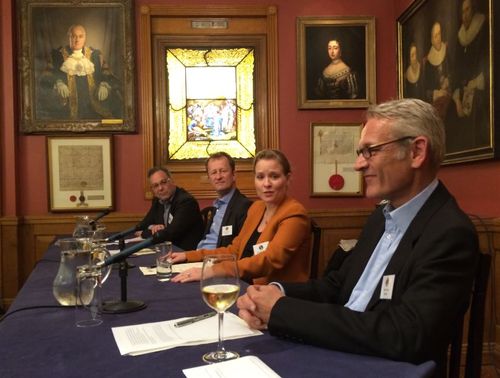
We had our annual debate This House Believes That SEPA Does Matter the other day, and a wonderful debate it was.
In previous years, we’ve moved from being on-the-fence about the proposition to moving firmly in its favour:
- 2010: This House Believed That SEPA DOES Matter (Just)
- 2011: This House Believed That SEPA Does NOT Matter (Just)
- 2012: This House Believed That SEPA DOES Matter (two-thirds in favour)
- 2013: This House Believed That SEPA DOES Matter (three-quarters in favour)
… although many think it may matter they firmly do not believe it’s delivering (yet), so what would happen this year?
Well, we stirred things up a little this year with our lead protagonists swapping sides. Usually, Ruth Wandhöfer, Global Head of Regulatory & Market Strategy with Citi Transaction Services, argues in favour of the motion whilst Simon Bailey, Director with CGI, argues it does not.
This year, under mutual agreement, they switched corners with Ruth arguing SEPA does NOT matter and Simon arguing that it does.
Simon was ably supported by Tom Buschman, CEO of Edge International; and Ruth’s motion was seconded by Neil Burton, Director with Earthport.

Simon began with a good case for the motion: This House Believes That SEPA Does Matter.
His key point was that the end-dates had arrived, the corporates are converting and the banks have delivered. As of 12th April 2014, 95.65% of credit transfers in the Eurozone were made as SEPA Credit Transfers (SCTs) and, more importantly, 82.6% of direct debits adhered to SEPA Direct Debit (SDDs) standards.
Over 8,000 banks and half a billion citizens are now working in a single payments market combining 18 countries* and uniting 27.
It’s achieved more htna this though, by bringing standards into the markets. SEPA is ISO20022 personified, and it’s simplified the bank to corporate workflow and process.
Ruth then stepped up to the plate and picked up on the issues of the program.
It’s been 12 years in the making, ever since the Lisbon Agreement and SEPA first plans in 2002.
It’s taken far too long and was a bank plan, rather than a plan to deliver benefits to bank customers.
It does not deliver the latest features we see in the UK and other markets, like real-time payments and mobile payment infrastructures.
Corporates and citizens don’t care about it, and they don’t see any reason why it’s here.
In fact, most corporates were aghast at having to migrate to IBANs and now SCTs and SDDs, as most corporates do not do business across borders.
Finally, there was quite a debate from Ruth about the flaws in SEPA being made by so many different interpretations of the PSD thanks to Additional Optional Services (AOS).
Simon refuted this by saying that the PSD has nothing to do with SEPA, as SEPA is the bank’s brainchild response to the PSD. So the flaws in the PSD do not take away the delivery of this infrastructure.

Ruth finished by stating that SEPA has only delivered what the banks wanted, and that it’s been a project that most would restart.
Tom then stepped up to the mark, and made a passionate plea that having had so much investment in SEPA, banks had to reap the rewards and this was good as it put the corporate customer in control.
The corporate is in the driving seat and can make demands of their bank they could never make before. Equally, they could set banks against each other across 16 countries that they could not before. In addition, they can take advantage of passporting and new money transmissions capabilities they could never take advantage of before.
This changes the game and the corporate should use this leverage to lower costs, improve working capital and supply chain structures.
Neil Burton counter-argued that if you compared the achievements of SEPA with the wonders of mankind built in previous centuries, it’s not really up there is it?
In fact, Neil enjoyed the evening so much, he provided me with his summary of the night:
The general tenure of the evening showed that SEPA clearly matters to the many who have been involved over the years – especially vendors and conference organisers, for whom it has driven revenue. But in more tangible terms – has it delivered or will it deliver material economic value commensurate with the investment, and to which stakeholder groups? How close has it come to achieving what it set out to do?
Major infrastructural projects usually cost more, and take longer than first estimated, so measurement against the original criteria alone isn't a fair assessment.
But it is nonetheless worth remembering what drove SEPA; the relatively high cost and unpredictable outcome of transferring funds from bank account to bank account within the Eurozone, which was in part believed to result from multiple duplicated schemes and infrastructures across different nation states.
Standardising those schemes would improve predictability and competitions, and competition would result in reduction of number of schemes, improving economies of scale and hence prices.
Motivation for SEPA in part at least was a) politicians expenses from Brussels to Sicily - lots of other ways to achieving that b) contribution to 2% economic growth - evidence pls? Sure, costs are down and speed is up,
Though significant progress has been made, as can be seen from the statistics presented on the ECB website; near % of credit transfers within the Eurozone are now made with SEPA Credit Transfers, and % ofDdirect Debits. Adoption of some of the norms embodied in the schemes such as ISO20022 and the use of IBANs is at least in line with, and in many cases leading, standardisation globally.
Transaction costs (and hence bank fees) ar down; predictability and transparency is up. But it's a stretch to give the credit to SEPA. That's down to the PSD not SEPA, and we could have had that outcome without all the SEPA investment.
But the job is far from done.
There is still considerable variance within the schemes; accommodation of nation state preferences means that a corporate operating Eurozone-wide cannot yet benefit from the reduced costs expected of a standard scheme.
Though the schemes have put in place basic building clocks, the real benefits are yet to be realised – and to do so will more than likely require concerted political will.
Which looks unlikely at this late stage.
SEPA has been a major investment in infrastructure; given it has cost squillions in investment and used up most of the spare capacity for the last ten years, how does it compare with similar projects from the last industrial revolution?
A BBC documentary considered the top seven major infrastructural investments of the current period, most of which were infrastructural/plumbing in nature - http://en.wikipedia.org/wiki/Seven_Wonders_of_the_Industrial_World).
For many of the participants, the internet, PayPal, and even bitcoin were far more obvious contenders.
Ultimately, though the effort expended has been huge, solutions to many of the challenges have come about in other ways.
There are now multiple methods to move funds across the Eurozone – and many of them operate just as effectively over legacy instruments as across the SEPA schemes.
Moore's law operates faster than the speed at which standards-driven change in a networked economy can operate, ergo, new technology will supersede.
Though the very largely SEPA-literate audience voted that SEPA matters, it is nonetheless doubtful whether a broader community of stakeholders would agree. And, absent further political will, that group of supporters looks more likely to dwindle than to grow.
If SEPA matters today, it seems less likely to tomorrow, unless something changes.
That is a pity; the job is only part done.
But whilst the date for adoption of the first generation of the schemes is colloquially referred to as the End-Date, and with so many other regulatory and other challenges on banks – many of which have been back-burnered over recent years in favour of SEPA - it seems unlikely to matter more than it does now.
With that impassioned and more lengthy plea from Neil, what was the final result?
Amazingly, it was overwhelmingly carried by 90% of the audience: SEPA does matter (but is it delivering … not yet).
* Austria, Belgium, Cyprus, Estonia, Finland, France, Germany, Greece, Ireland, Italy, Latvia, Luxembourg, Malta, the Netherlands, Portugal, Slovakia, Slovenia, and Spain
Chris M Skinner
Chris Skinner is best known as an independent commentator on the financial markets through his blog, TheFinanser.com, as author of the bestselling book Digital Bank, and Chair of the European networking forum the Financial Services Club. He has been voted one of the most influential people in banking by The Financial Brand (as well as one of the best blogs), a FinTech Titan (Next Bank), one of the Fintech Leaders you need to follow (City AM, Deluxe and Jax Finance), as well as one of the Top 40 most influential people in financial technology by the Wall Street Journal's Financial News. To learn more click here...

